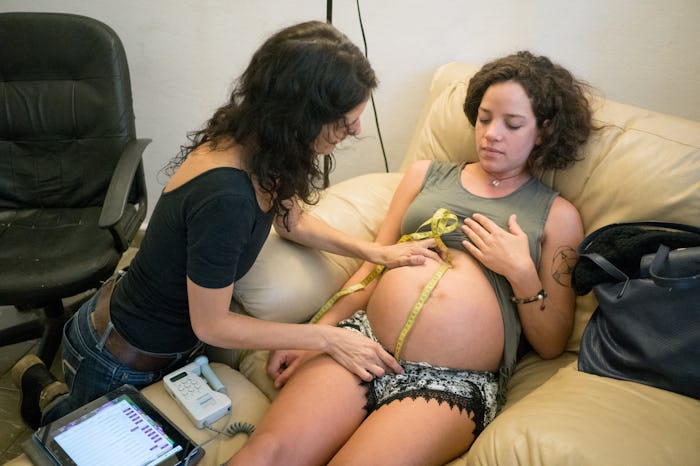News

Pregnant Women In Puerto Rico Are Stranded Without OB-GYNs — Here's How You Can Help
Nearly two months after Hurricane Maria made landfall in Puerto Rico, the island continues to struggle with a humanitarian crisis. More than half of its residents are still without power and a fifth don't have access to clean drinking water. And things like prenatal care or supplies for labor and delivery? They're extremely hard to come by, leaving pregnant women and their babies at risk. The harrowing reality of the situation is Puerto Rico's maternity care is in jeopardy following Hurricane Maria. And it's absolutely heartbreaking.
Following the devastating destruction and widespread flooding wrought by the storm, pregnant women are being forced to make tough decisions about where to deliver their babies, according to a recent article from VICE. That's because moms-to-be aren't able to contact their physicians, or are being turned away from over-burdened healthcare facilities. Plus, in the midst of all the flooding, Zika carried by mosquitos is a serious concern.
“The system is just overwhelmed. The doctor-to-patient ratio is too high,” said Ted Held, a physician and volunteer OB-GYN with Circle of Health International — which, according to the organization's website, sends volunteer medical professions to assist women and children in crisis zones. Dr. Held, who assessed the quality of maternal healthcare at nine clinics near San Juan following the hurricane, found that many pregnant women are living in poor conditions. More often than not, this means they don't have enough clean water or food to eat. Additionally, many moms-to-be can't afford doctor appointments, nor can they afford gas to get there. Held also told VICE that he's particularly worried about women in places like Loiza, where 68 percent of the residents live below the poverty line.
Many expecting women are understandably torn about what they should do in such dire circumstances. Because either option comes with its risks. If they attempt to make it to a hospital, they face mosquitos and flooding — plus, they could ultimately be turned away. But a home birth could be potentially dangerous as well. Especially without electricity — which only 50 percent the island has, and sometimes less because of recent outages, reports Vox.
Another concern, amid the ongoing humanitarian crisis in Puerto Rico? Preterm labor, according to Jose Cordero, a former dean at the University of Puerto Rico’s Graduate School of Public Health. “We know that an environment where you go through a disaster is an extremely stressful environment, and so one of the concerns is that the stress could be a factor for early delivery,” Cordero told VICE. “At this point we don’t know yet. But that’s something that we are looking for.”
VICE reports Claritza Martinez originally planned to deliver her baby in a hospital 10 minutes away from her home in Puerto Rico. However, the hospital's maternity ward and operating room has been closed due to the incredibly high demand for other health services. Thankfully, Martinez was able to find a midwife, who assisted in the nighttime birth by the light of a cellphone. “The baby has to get born one way or another, but what better way than in our house, in peace,” Martinez told VICE. “I don’t know how things would’ve ended if I didn’t have a midwife.”
Just wow. Clearly, more needs to be done.
So what can we do to help women like Martinez, along with those who are even worse-off living in poverty and/or in rural areas? Here are a couple of ways to make a difference.
- Donate to Circle of Health. So far, Circle of Health has donated more than 4,000 pounds of maternal health care supplies to medical provers in Puerto Rico, according to VICE.
- Support Centro MAM. The midwife who helped deliver Martinez's baby was a volunteer from this clinic near San Juan. Over the past two months, Centro MAM has cared for more than 200 women and families in Puerto Rico. This includes home birth facilitation, as well as zika prevention, prenatal and postpartum checkups and a breastfeeding station at its office.
As a mom of three, I cannot begin to imagine what it must be like for families living in Puerto Rico under the current conditions. I mean, pregnancy and childbirth are are hard enough without having to worry about giving birth alone at home, without electricity. These moms and babies desperately need our help.
Check out Romper's new video series, Romper's Doula Diaries:
Watch full episodes of Romper's Doula Diaries on Facebook Watch.